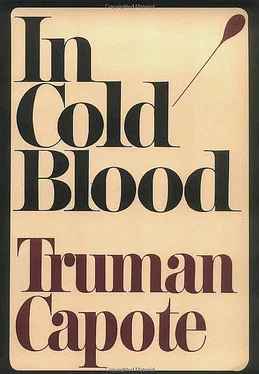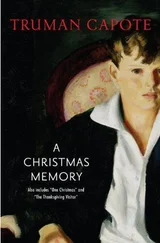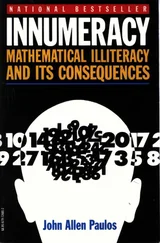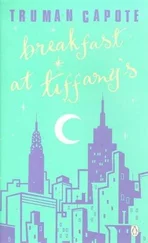“Because you’re silly,” he said, tossing her the head of a flower, a wilted dahlia, which she jammed into her hair.
Mr. Helm picked up his spade. Crows cawed, sundown was near, but his home was not; the lane of Chinese elms had turned into a tunnel of darkening green, and he lived at the end of it, half a mile away. “Evening,” he said, and started his journey. But once he looked back. “And that,” he was to testify the next day, “was the last I seen them. Nancy leading old Babe off to the barn. Like I said, nothing out of the ordinary.”
The black Chevrolet was again parked, this time in front of a Catholic hospital on the outskirts of Emporia. Under continued needling (“That’s your trouble. You think there’s only one right way—Dick’s way”), Dick had surrendered. While Perry waited in the car, he had gone into the hospital to try and buy a pair of black stockings from a nun. This rather unorthodox method of obtaining them had been Perry’s inspiration; nuns, he had argued, were certain to have a supply.
The notion presented one drawback, of course: nuns, and anything pertaining to them, were bad luck, and Perry was most respectful of his superstitions. (Some others were the number 15, red hair, white flowers, priests crossing a road, snakes appearing in a dream.) Still, it couldn’t be helped. The compulsively superstitious person is also very often a serious believer in fate; that was the case with Perry. He was here, and embarked on the present errand, not because he wished to be but because fate had arranged the matter; he could prove it—though he had no intention of doing so, at least within Dick’s hearing, for the proof would involve his confessing the true and secret motive behind his return to Kansas, a piece of parole violation he had decided upon for a reason quite unrelated to Dick’s “score” or Dick’s summoning letter. The reason was that several weeks earlier he had learned that on Thursday, November 12, another of his former cellmates was being released from Kansas State Penitentiary at Lansing, and “more than anything in the world,” he desired a reunion with this man, his “real and only friend,” the “brilliant” Willie-Jay.
During the first of his three years in prison, Perry had observed Willie-Jay from a distance, with interest but with apprehension; if one wished to be thought a tough specimen, intimacy with Willie-Jay seemed unwise. He was the chaplain’s clerk, a slender Irishman with prematurely gray hair and gray, melancholy eyes. His tenor voice was the glory of the prison’s choir. Even Perry, though he was contemptuous of any exhibition of piety, felt “upset” when he heard Willie-Jay sing “The Lord’s Prayer”; the hymn’s grave language sung in so credulous a spirit moved him, made him wonder a little at the justice of his contempt. Eventually, prodded by a slightly alerted religious curiosity, he approached Willie-Jay, and the chaplain’s clerk, at once responsive, thought he divined in the cripple-legged body builder with the misty gaze and the prim, smoky voice “a poet, something rare and savable.” An ambition to “bring this boy to God” engulfed him. His hopes of succeeding accelerated when one day Perry produced a pastel drawing he had made—a large, in no way technically naive portrait of Jesus. Lansing’s Protestant chaplain, the Reverend James Post, so valued it that he hung it in his office, where it hangs still: a slick and pretty Saviour, with full lips and grieving eyes. The picture was the climax of Perry’s never very earnest spiritual quest, and, ironically, the termination of it; he adjudged his Jesus “a piece of hypocrisy,” an attempt to “fool and betray” Willie-Jay, for he was as unconvinced of God as ever. Yet should he admit this and risk forfeiting the one friend who had ever “truly understood” him? (Hod, Joe, Jesse, travelers straying through a world where last names were seldom exchanged, these had been his “buddies”—never anyone like Willie-Jay, who was in Perry’s opinion, “way above average intellectually, perceptive as a well-trained psychologist.” How was it possible that so gifted a man had wound up in Lansing? That was what amazed Perry. The answer, which he knew but rejected as “an evasion of the deeper, the human question,” was plain to simpler minds: the chaplain’s clerk, then thirty-eight, was a thief, a small-scale robber who over a period of twenty years had served sentences in five different states.) Perry decided to speak out: he was sorry, but it was not for him—heaven, hell, saints, divine mercy—and if Willie-Jay’s affection was founded on the prospect of Perry’s some day joining him at the foot of the Cross, then he was deceived and their friendship false, a counterfeit, like the portrait.
As usual, Willie-Jay understood; disheartened but not disenchanted, he had persisted in courting Perry’s soul until the day of its possessor’s parole and departure, on the eve of which he wrote Perry a farewell letter, whose last paragraph ran: “You are a man of extreme passion, a hungry man not quite sure where his appetite lies, a deeply frustrated man striving to project his individuality against a backdrop of rigid conformity. You exist in a half-world suspended between two superstructures, one self-expression and the other self-destruction. You are strong, but there is a flaw in your strength, and unless you learn to control it the flaw “will prove stronger than your strength and defeat you. The flaw? Explosive emotional reaction out of all proportion to the occasion. Why? Why this unreasonable anger at the sight of others who are happy or content, this growing contempt for people and the desire to hurt them? All right, you think they’re fools, you despise them because their morals, their happiness is the source of your frustration and resentment. But these are dreadful enemies you carry within yourself—in time destructive as bullets. Mercifully, a bullet kills its victim. This other bacteria, permitted to age, does not kill a man but leaves in its wake the hulk of a creature torn and twisted; there is still fire within his being but it is kept alive by casting upon it faggots of scorn and hate. He may successfully accumulate, but he does not accumulate success, for he is his own enemy and is kept from truly enjoying his achievements.”
Perry, flattered to be the subject of this sermon, had let Dick read it, and Dick, who took a dim view of Willie-Jay, had called the letter “just more of Billy Graham cracker’s hooey,” adding, “ ‘Faggots of scorn!’ He ’ s the faggot.” Of course, Perry had expected this reaction, and secretly he welcomed it, for his friendship with Dick, whom he had scarcely known until his final few months in Lansing, was an outgrowth of, and counterbalance to, the intensity of his admiration for the chaplain’s clerk. Perhaps Dick was “shallow,” or even, as Willie-Jay claimed, “a vicious blusterer.” All the same, Dick was full of fun, and he was shrewd, a realist, he “cut through things,” there were no clouds in his head or straw in his hair. Moreover, unlike Willie-Jay, he was not critical of Perry’s exotic aspirations; he was willing to listen, catch fire, share with him those visions of “guaranteed treasure” lurking in Mexican seas, Brazilian jungles.
After Perry’s parole, four months elapsed, months of rattling around in a fifth-hand, hundred-dollar Ford, rolling from Reno to Las Vegas, from Bellingham, Washington, to Buhl, Idaho, and it was in Buhl, where he had found temporary work as a truck driver, that Dick’s letter reached him: “Friend P., Came out in August, and after you left I met Someone, you do not know him, but he put me on to something we could bring off beautiful. A cinch, the Perfect score…” Until then Perry had not imagined that he would ever see Dick again. Or Willie-Jay. But they had both been much in his thoughts, and especially the latter, who in memory had grown ten feet tall, a gray-haired wise man haunting the hallways of his mind. “You pursue the negative,” Willie-Jay had informed him once, in one of his lectures. “You want not to give a damn, to exist without responsibility, without faith or friends or warmth.”
Читать дальше












